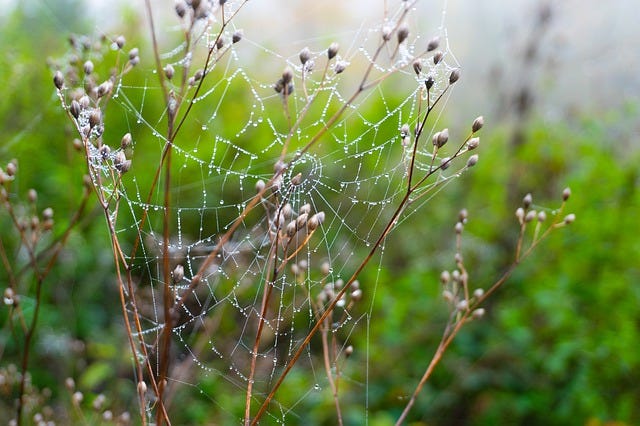Creating The Webbd Wheel: Finding Our Place
I believe the world needs every one of us for some specific purpose. I’m not talking about being born to be an influencer, or rich and famous, or a great criminal mind, or a great artist. I’m talking about ordinary people like you and me. Somehow, somewhere, we are needed. We have something unique to give. We may never know what it is or why we are important, but that only makes the idea more powerful. Just by being ourselves, living our lives, we give the world some kind of a gift only we can give.
If you’ll enter into this belief with me for just a few minutes, it follows each of our lives is a kind of quest, both inward and outward. Who are we and where do we belong? What are we for? Can we ever know for sure?
If we have something special to give, can we discover it? How can we give anything from our state of being if we don’t know who we are?
The tension between our ambitious hopes and dreams and our ability and limitations is an experience we all share. None of us are nothing. None of us are everything. Social forces shape us, sometimes brutally, and distort our view of ourselves. It’s not easy to be objective about our purpose and meaning, to find a quiet space for self-enquiry. We are consistently pressured to force ourselves to be something other than we are. We are savagely brainwashed into believing our needs involve endless consumption and production. Many of us are, at one time or another, emotionally enslaved and develop a belief our only purpose is to be at the service of others.
Nephthys’ desert is a place between, like Hades. It’s sere and stark, uncluttered, quiet. Deserts are subtle, simple. It’s a place of bones, a place in which to excavate through layers of debris for roots, for essence.
In post #67, both Maria and Kunik ask questions we all ask ourselves at one time or another: What do I want? Where do I go from here? Who am I?
What do I need to know?
Nephthys, that strange, ancient child, is their guide.
Weaving Webs
I’ve read a lot of content remarking on a cultural shift from emphasis on community and kin groups (patriotism, religion, traditional family, etc.) to idolization of self. Generally, this view is framed negatively, as though we’ve lost something, some kind of glue essential to social health.
I don’t see service to community and self-care as mutually exclusive. In fact, I bristle a little around the subject, having spent most of my life viewing myself as nothing and nobody unless I was in service to someone else. I’ve been a life-long volunteer and I’ve always been happiest making contributions to either people or animals in every way I could. Although I believe I’ve made the world a better place, it was at the cost of myself. I was taught to believe there is no me; I’m here solely for the use of others. To care for myself, to be myself, is extreme selfishness.
Many women are taught this, and it’s reinforced every day by the patriarchy, often invisibly.
Having largely reclaimed myself during these last ten years or so, now I see the care and nurture of ourselves as an essential first step toward building healthy communities. People who give blind, unthinking, unquestioning obedience to ideologues and authoritarians are not building healthy community because they themselves are not healthy.
What we’re observing now is people stuck in the capitalist arena of “self-care.” Capitalist “self-care” is about slavery, addiction and dependence, production and, most of all, spending money. It’s not about health, or beauty, or an effective diet. It’s not about community or relationship. It’s not about coming into alignment with the planet and the life on it.
Love, respect and trust cannot be bought and sold, yet these are the foundations of community. If we don’t love ourselves, no amount of surgery, drugs, makeup, or clothing can change it. We are taught to believe the opposite, so we remain desperately addressing our isolation, our fear, out bitterness, and our trauma with things. Which cost money. We can’t look away from our mirrors or daily grinds for a paycheck long enough to think about those around us, unless we’re comparing ourselves to them, usually unfavorably. Our brokenness obscures all thoughts of community. If we are attracted into a community, it’s often a toxic one based on power-over and control, one which feeds our fears of others, our dissatisfaction, and our dysfunction.
Building healthy community starts with knowing ourselves. It starts with self-discovery. It doesn’t stop there. Once we are grounded in our own being with love, respect, and trust, we are ready to interact with others in positive, effective ways. We’re ready to give and receive. We’re ready with generosity and reciprocity, with healthy loyalty and faith. All these intangibles, however, arise out of self-knowledge, out of successfully integrating our shadows, our choices, and the consequences of those choices.
Turning Over Stones
Questions:
How do you balance self-care with service to others in your life?
Who taught you to care for yourself, or who taught you not to?
What does self-care mean to you?
What kind of self-care do you practice that is not attached to spending money?
What kind of self-care do you practice that is attached to spending money?
What ordinary person has changed your life in an extraordinary way?
Leave a comment below!




